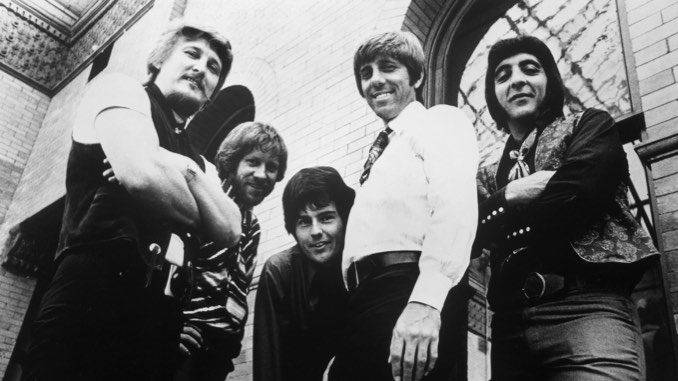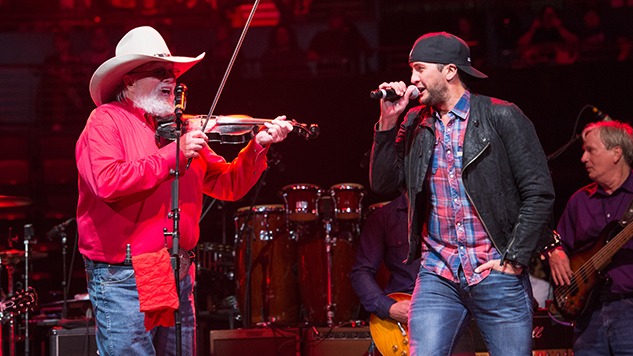Today’s pop music is so dependent on the human voice—whether singing or rapping—that it’s hard to imagine a time when instrumentals could be mainstream hits. In fact, no instrumental has topped the U.S. pop singles chart since Jan Hammer’s “Miami Vice Theme” in 1985. As the sounds on pop records become more and more synthetic (not necessarily a bad thing), it becomes more important to have a recognizably human vocal in the foreground. Such a voice can provide words for what the instruments are implying and can provide a dramatic protagonist with which we listeners can identify.
And yet there was a time when instrumental parts could be so melodic that no voice was needed to make the feeling explicit, so evocative that the saxophone or guitar could play the lead character in the mini-story that each song tells. This was especially true in the ’30s and ’40s, when the big dance bands dominated the charts, but it was also true in the guitar era of the ’50s through the ’80s, from Duane Eddy’s “Rebel-‘Rouser” to the Average White Band’s “Pick Up the Pieces.”
No instrumental rock band had more consistent success, though, than The Ventures. Without a single vocal, this Tacoma, Washington, quartet (two guitars, bass and drums) scored 16 top-40 albums and six top-40 singles between 1960 and 1969. They did it by finding the perfect balance between a tune you could hum and a beat you could dance to. This wasn’t instrumental music to show off the players’ virtuosity; these were simple but hypnotic earworms that listeners couldn’t shake out of their heads.
And the key to that was rhythm guitarist Don Wilson, who died on Jan. 22. He voiced his uptempo, choppy guitar chords so the melody line was always on top. Either Bob Bogle or Nokie Edwards would reinforce that vocal-like line with a single-note, lead-guitar line drenched in reverb. With Mel Taylor on drums and Bogle or Edwards on bass, the propulsion was as irresistible as the simple guitar hooks. The quartet created a musical world so full of feeling and motion that no vocal was necessary.
They were country-music fans who were fooling around with the new generation of Fender guitars, basses and amps. By loading a tune with reverb, adding a sizzling amplifier edge and upping the tempo, The Ventures turned country material into rock ‘n’ roll. Their breakthrough hit, for example, was “Walk, Don’t Run,” a catchy tune written by jazz guitarist Johnny Smith in 1954 and popularized by country guitarist Chet Atkins three years later. Three years after that, The Ventures replaced the hollow-body guitars of Smith and Atkins with added solid-body Fenders, and changed the relaxed swing into a frantic stomp. The result was a #2 pop single.
The Ventures’ early hit singles (also 1960’s “Perfidia” and 1961’s “Ram-Bunk-Shush”) had a great impact on the nascent surf-music scene down the West Coast in Southern California. Dick Dale, in particular, recognized the possibilities of The Ventures’ innovations and pushed them much further, added a wave-like whoosh and spray-like staccato notes. These innovations were inspired not only by his experiences as a surfer, but also by his family’s Lebanese background (Dale’s birth name was Richard Monsour). This in turn influenced The Ventures, who redid “Walk, Don’t Run” in a Dale-like arrangement and took the song back to the pop top 10 in 1964.
The death of Wilson, the last surviving member of The Ventures’ classic lineup, was one more reminder of the greatly diminished role instrumentals now play in pop music. In this century, dividing pop music into instrumental and vocal categories is like dividing the animal kingdom into squirrels and non-squirrels.
Instrumentals have become such a vanishingly small percentage of the market that in 2012, the Grammy Awards eliminated the prizes for Best Pop Instrumental Performance, Best Rock Instrumental Performance and Best Country Instrumental Performance, citing the paltry number of eligible recordings. (Tellingly, though, the Grammies never canceled the Jazz Instrumental category; they even added a second category, Contemporary Instrumental, to handle “smooth jazz.”)
And yet there are stubborn holdouts. This year, for example, Rick Holmstrom has released a delightful guitar-instrumental album, Get It! From 1985 through 2007, Holmstrom was a familiar figure on the contemporary blues scene, releasing the occasional solo album and making a living as the guitarist for such singer-harmonica players as William Clarke, Johnny Dyer and Rod Piazza. In 2007, however, Holmstrom released a stripped-down, trio album, Late in the Night. Mavis Staples was so impressed that she hired Holmstrom as her guitarist and music director, roles that he has filled ever since.
Those years have given Holmstrom a post-graduate education in the guitar style of Mavis’s father, Roebuck “Pops” Staples. Pops was one of the 20th century’s foremost musical minimalists; he pared down his playing to a scant handful of barbed-wire notes that spoke volumes. That syntax was rooted in the Mississippi gospel music where he began, but it led to Chicago R&B and stardom. But even in those genres, Pops was an outlier, displaying a restraint more ruthless and choices more tasteful than anyone else. Holmstrom is one of the few guitarists to fully embrace that style, and you can hear the payoff on Get It!
The new album returns to his proven trio format. Backed by drummer Steve Mugalian and longtime Dave Alvin bassist Gregory Boaz, Holmstrom doesn’t need a second guitarist, because he alternates single-note phrases and percussive chords so persuasively that it feels as if both a lead guitarist and rhythm guitarist are on hand. Each of the 14 original compositions boasts a Ventures-like melodic hook, even if the starting point is the blues rather than country. No vocals are needed.
“The blues artists I backed when I was younger all had me play instrumentals to open the show,” Holmstrom says in the album’s press materials. “Some nights I’d play four or five of them. It was all part of the build-up to a spicey show … So I had a foot in this world all along. I like the challenge of trying to say something without words, to grab people’s ears with just melody, groove and dynamics.”
One tune, “Surfer Chuck,” melds the influences of Dick Dale and Chuck Berry into something new. On another, “King Freddie,” he pays tribute to blues legend Freddie King. On the first single, “Erlee Time,” he uses pauses to build anticipation for one or the other of two strong themes. Throughout the album one can detect the ghost of Pops Staples, stabbing the notes like a tattoo artist. No wonder Mavis calls Holmstrom “Pops Junior.”
If Holmstrom represents the minimalist wing of guitar instrumentals, Steve Vai represents the maximalist wing, part of a heavy-metal, hard-rock scene notorious for its bombastic excess. But unlike fellow shredders such as Joe Satriani and Yngwie Malmsteen, Vai has a sense of melody, quirkiness and humor that makes him an anomaly. Perhaps it’s his background of studying jazz at Berklee and touring with such musical comedians as Frank Zappa and David Lee Roth.
You can hear as much on his new, all-instrumental solo album, Inviolate. The project isn’t free of metal’s gimmicks. The front cover finds Vai blindfolded and holding his custom-made, steampunk, triple-neck guitar called the Hydra, an instrument featured on the showoff-y track “Teeth of the Hydra.” It’s not till the third track, “Little Pretty,” that Vai returns to his strengths: a compellingly melodic theme played on a six-string guitar with an emphasis more on appealing variations than on empty virtuosity.
Even better is “Candlepower,” a duet between Vai and his fellow Zappa alumnus, drummer Terry Bozzio. The two men relax and bring out the pleasure in Vai’s sparkling composition; the embellishments are brief enough to add some flair without digressing too far. “Avalancha” is as fast and noisy as its name implies, but the attractive central theme is always patiently repeated amid the chaos around it. “Greenish Blues” is a slow blues tune with perhaps Vai’s best melody; you can almost imagine someone is singing. The album is full of shredder identifiers, but if you can get past the genre baggage, it’s a rewarding listen.
Nels Cline is best known as a member of Wilco, but this tall, gangly guitarist’s gifts are underutilized in that band’s cramped songwriting. A far better showcase is the new album, Seven Limbs, which brings together Cline and the Aizuri Quartet to play an extended composition by composer Douglas J. Cuomo.
“This piece is inspired by an ancient Buddhist practice called ‘The Seven Limbs,’” Cuomo writes in the linter notes. “The practice has a lot of words (which are usually chanted), while this music has none. However, the purpose of the words is to take you to a place beyond words, and that space is somewhere music can live. As I was composing, I was going after the feel of ‘The Seven Limbs,’ setting the text without using words.’
That’s a good description of instrumental music at its best, and this album mostly lives up to that high ideal. The classical string quartet plays a notated score, while Cline is given a few written-out ideas and encouraged to improvise on them on a variety of guitars supplemented by electronics. This results not only in the serene, contemplative passages that reflect most Westerners’ notion of Buddhism, but also wild, discordant sections that suggest the wrestling with uncertainty and inner demons that are also a part of meditation.
Cline can be as noisy and abrasive as Vai without being bound by hard rock’s conventions. Cline’s electronic roars and wails, often set against the staccato stabs of the strings, evoke the internal struggle we all experience, and make the eventual stillness seem hard won and well earned.
Like Cline, Bill Frisell plays in both instrumental and vocal situations. His own projects are usually wordless, but he has also recorded with Elvis Costello, Lucinda Williams, Laura Veirs, Bonnie Raitt and Marianne Faithfull. He is able to enhance a vocalist’s performance, because his own guitar-work is so lyrical that it often resembles singing. In fact, Frisell’s latest project as a leader is an ensemble called Harmony, a quartet with Charlie Haden’s daughter Petra singing lead, while cellist Hank Roberts and guitarist Luke Bergman sing harmonies.
Frisell’s latest appearance is as a sideman on the new, all-instrumental Ches Smith album, Interpret It Well. The percussionist had led a trio featuring Craig Taborn and Mat Maneri from 2016-2019, but when Frisell began sitting in with the group, it seemed impossible to make the next album without him. The seven compositions are all by Smith, but Frisell’s distinctive guitar voice stands out in the musical conversations.
Like Seven Limbs, Interpret It Well toggles between focused quiet and unholy chaos, with Frisell handling the extremes as persuasively as Cline. Frisell adds something else, though: a melodicism that fills both the tension and its resolution with implied language. The guitarist can be as percussive as Smith’s drums and vibes or Taborn’s piano, but also as fluid as Maneri’s viola. As such, he provides a bridge for the conversation to cross.
The back-and-forth between the four musicians is as unpredictable as it is invigorating. But it’s Smith’s simple, repeating motifs that keep the music grounded so that what happens next always feels connected to what came before.
In recent years, Frisell has often played with Charles Lloyd & The Marvels, and the rhythm section from that band—bassist Reuben Rogers and drummer Eric Harland—recorded an instrumental trio album, Close Your Eyes, with another superb guitarist, Lionel Loueke, in 2018. Finally available on CD, this revelatory record documents the African guitarist on his first album of jazz standards: John Coltrane’s “Naima,” Miles Davis’s “Solar” and Henry Mancini’s “Moon River.”
But these versions sound unlike any others, due in large part to Loueke’s unusual background. Born and raised in Benin, Loueke became so entranced by a vinyl George Benson album that he resolved to learn Benson’s instrument, even if he had to use the brake cables from a bicycle as strings. He began learning as much jazz repertoire as possible, but he refused to unlearn the music of urban West Africa’s highlife dance bands, or of rural Benin’s folkloric drummers and choruses.
He carried those local musics with him, even as he traveled to Abidjan, then Paris, then Boston to advance his education. As a result, he sounds like neither jazz legends such as Benson, nor like highlife heroes such as King Sunny Ade. Instead, he became one of the few inhabitants of the no man’s land in between. You can hear that on Close Your Eyes, where Loueke’s guitar playing has the chiming, percussive attack of the West African Kora and the harmonic richness of the American archtop guitar.
In 2001, Loueke auditioned for the Thelonious Monk Institute of Jazz. The try-outs were held in a small room at the University of Southern California, where Loueke played Wayne Shorter’s “Footprints” for a panel of judges that included Shorter, Herbie Hancock and Terence Blanchard. Loueke prefaced the tune with a long scatting-and-picking introduction that reflected his Benin roots before segueing smoothly into the jazz theme. At the end, Shorter stood up and exclaimed, “I told you guys, I’m from Africa. He’s my brother.”
Loueke reprises “Footprints” on the new album, without the vocal scatting, but with the rhythmic snap of African string playing. Harland is right there with him on the syncopated accents, and Rogers drops low, fat bass notes to denote the chord changes. Monk himself is saluted on his tune “We See,” which the guitarist pushes and restrains with dramatic effect but without ever losing the memorable melody. The feeling is so clear that no words are needed.




